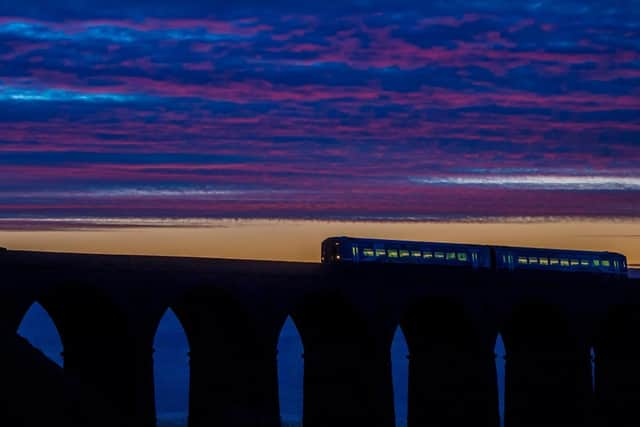Government urged to take action to tackle 'damaging' light pollution by Dark Skies supporters
The All-Party Parliamentary Group (APPG) for Dark Skies has claimed that light pollution is growing exponentially, and new initiatives are needed to crack down on the crisis of “night blight”.
The APPG’s new report, which was published today (DEC 9), has highlighted major gaps in the existing legal framework and planning permission process regulating light pollution and calls for new measures to protect the UK’s dark skies and night-time landscapes.
Advertisement
Hide AdAdvertisement
Hide AdParliamentarians have said that in order to enforce rules and enhance oversight, the Government needs to set up a statutory Commission for Dark Skies and designate a new Minister for the Dark Sky.


They added that the UK must join countries such as France and South Korea which have already legislated for the improved protection of dark skies, with approaches that focus on planning regulation, light curfews and metrics limiting light output.
Lord Martin Rees, the Astronomer Royal and the co-chairman of the group, added: “The case for controlling light pollution has scientific, educational, environmental, aesthetic and economic dimensions. It's a deprivation for us all to never see a dark night sky.
“The Government should implement modest changes in the planning and regulatory system that could stem and indeed reverse the current trend.
Advertisement
Hide AdAdvertisement
Hide Ad“Such measures would certainly earn the gratitude of the next generation and would surely command broad support today.”
The release of the report comes as the Yorkshire Dales and North York Moors National Parks were this week officially recognised for their dark skies and star-gazing opportunities.
The International Dark-Sky Association has designated the two National Parks in North Yorkshire as International Dark Sky Reserves, allowing them to join an exclusive global family of locations renowned for astronomy.
The announcement on Tuesday was the culmination of five years of work, and is expected to bring benefits for both tourism as well as shaping more environmentally-friendly planning policies to minimise the impact of light pollution.
Advertisement
Hide AdAdvertisement
Hide AdA debate will be held in Parliament on Monday next week to give MPs the chance to discuss the Government’s policy on dark skies as well as highlighting the points raised in the new report.
The most recent annual Star Count survey published by the CPRE countryside charity in May this year found that 61 per cent of people in the UK are in areas with severe light pollution - meaning that they could count fewer than 10 stars in the Orion constellation.
This represented a rise in the number of people experiencing severe light pollution from the previous year when 57 per cent of people taking part fell into that category.
Across Yorkshire, 65.2 per cent reported that they saw fewer than 10 stars.
Advertisement
Hide AdAdvertisement
Hide AdThose who experienced “truly dark skies” - seeing more than 30 stars - was just 1.7 per cent.
MP Andrew Griffith, who founded the parliamentary Dark Skies group and whose constituency of Arundel and South Downs contains one of the UK’s International Dark Sky Reserves, has previously called for special recognition of dark skies.
He suggested that the next draft of the National Planning Policy Framework be used to preserve and restore the ability of future generations to see the constellations on a dark night.
Mr Griffith said: “We need to act now so that future generations may still be able to see the stars and the Milky Way – something that is already impossible in many parts of the country.
Advertisement
Hide AdAdvertisement
Hide Ad“New development, bad lighting and ‘horizon pollution’ are a growing threat and we want to see these proposals tabled in Parliament and adopted by the Government.”
Campaigners have joined the APPG’s members in calling on the Government to tackle steps to halt light pollution and re-shape planning policies.
The CPRE’s dark skies campaigner, Emma Marrington, said: “Starry night skies are one of the most magical sights the countryside has to offer - but light pollution means many people don’t get to experience them.
“It’s high time that action is taken nationally and locally to stem the flow of unwanted light.
Advertisement
Hide AdAdvertisement
Hide Ad“This would not only save money but would help to tackle the climate and nature emergencies, while limiting the impacts of light pollution on our health and wellbeing.
“Over nine in 10 people agree that gazing up at a sky full of stars has a positive impact on their well-being.
“That’s why we are urging the government to pursue the 10 dark sky policies recommended by the APPG for dark skies.
“This includes introducing national legislation to reduce light pollution. Action now will mean more people than ever will be able to experience the wonder of a truly dark starry night sky in years to come.”
The Government has been approached for comment.
Comment Guidelines
National World encourages reader discussion on our stories. User feedback, insights and back-and-forth exchanges add a rich layer of context to reporting. Please review our Community Guidelines before commenting.